Academic and Professional Skills 1: Olympics Event Impact Analysis
VerifiedAdded on 2023/01/03
|9
|2538
|22
Report
AI Summary
This report analyzes the multifaceted impacts of the global Olympics event, focusing on tourism, hospitality, and the event industry. It examines the economic investments required by host countries, including infrastructure development and environmental considerations. The report delves into the positive aspects, such as job creation and increased tourism, while also addressing the costs to taxpayers and potential economic instability. It explores the influence on tourism, hospitality, and the event industries, highlighting the short-term and long-term effects on the host countries. The report also discusses the event's impact on future trade and the broader social and environmental consequences, offering a comprehensive overview of the Olympics' global influence. The analysis includes recommendations for organizers to mitigate potential challenges and enhance the event's positive outcomes.

ACADEMIC AND PROFESSIONAL
SKILLS
1
SKILLS
1
Paraphrase This Document
Need a fresh take? Get an instant paraphrase of this document with our AI Paraphraser
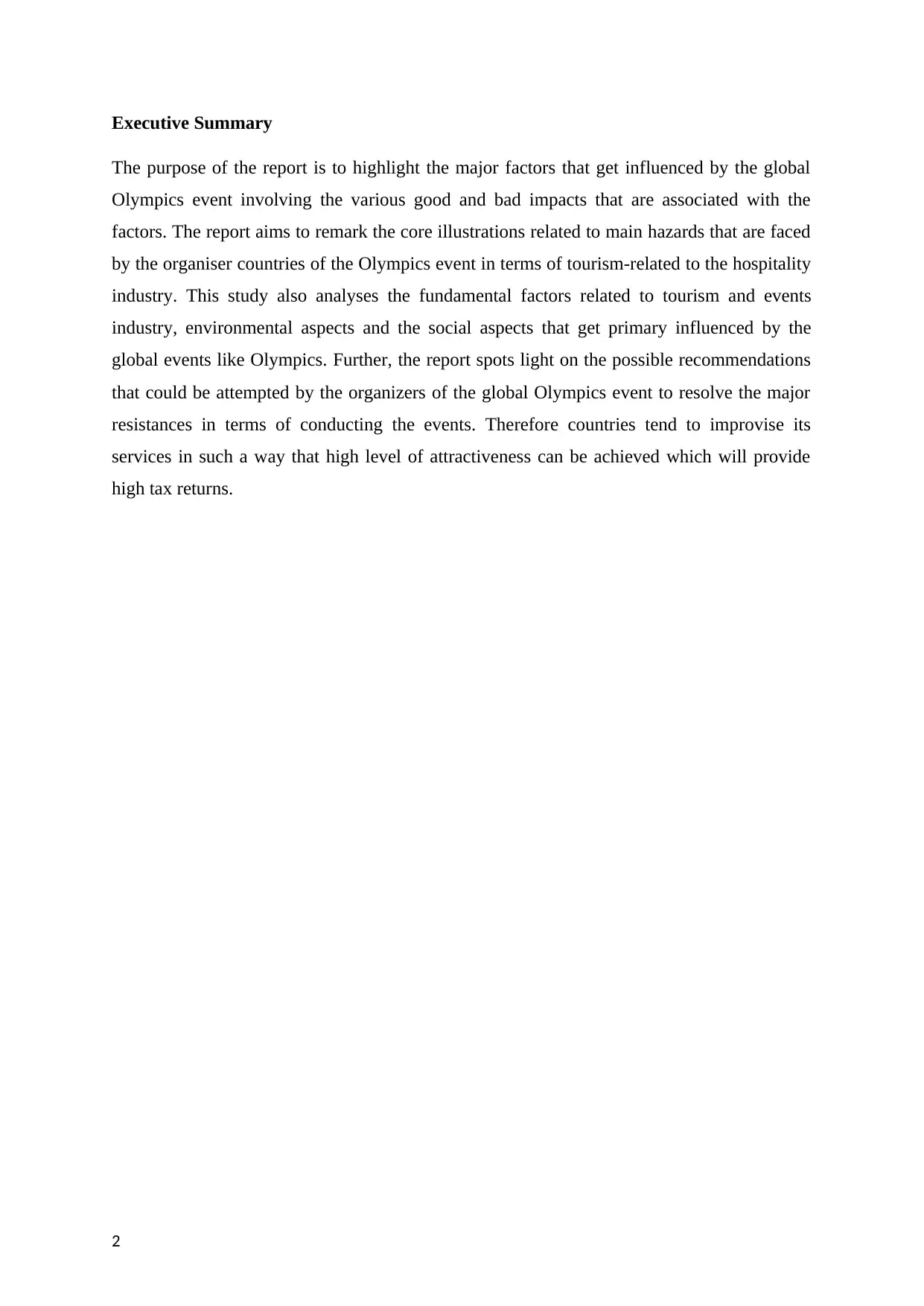
Executive Summary
The purpose of the report is to highlight the major factors that get influenced by the global
Olympics event involving the various good and bad impacts that are associated with the
factors. The report aims to remark the core illustrations related to main hazards that are faced
by the organiser countries of the Olympics event in terms of tourism-related to the hospitality
industry. This study also analyses the fundamental factors related to tourism and events
industry, environmental aspects and the social aspects that get primary influenced by the
global events like Olympics. Further, the report spots light on the possible recommendations
that could be attempted by the organizers of the global Olympics event to resolve the major
resistances in terms of conducting the events. Therefore countries tend to improvise its
services in such a way that high level of attractiveness can be achieved which will provide
high tax returns.
2
The purpose of the report is to highlight the major factors that get influenced by the global
Olympics event involving the various good and bad impacts that are associated with the
factors. The report aims to remark the core illustrations related to main hazards that are faced
by the organiser countries of the Olympics event in terms of tourism-related to the hospitality
industry. This study also analyses the fundamental factors related to tourism and events
industry, environmental aspects and the social aspects that get primary influenced by the
global events like Olympics. Further, the report spots light on the possible recommendations
that could be attempted by the organizers of the global Olympics event to resolve the major
resistances in terms of conducting the events. Therefore countries tend to improvise its
services in such a way that high level of attractiveness can be achieved which will provide
high tax returns.
2

Table of Contents
Introduction...........................................................................................................................................4
Analysis..................................................................................................................................................5
3
Introduction...........................................................................................................................................4
Analysis..................................................................................................................................................5
3
⊘ This is a preview!⊘
Do you want full access?
Subscribe today to unlock all pages.

Trusted by 1+ million students worldwide
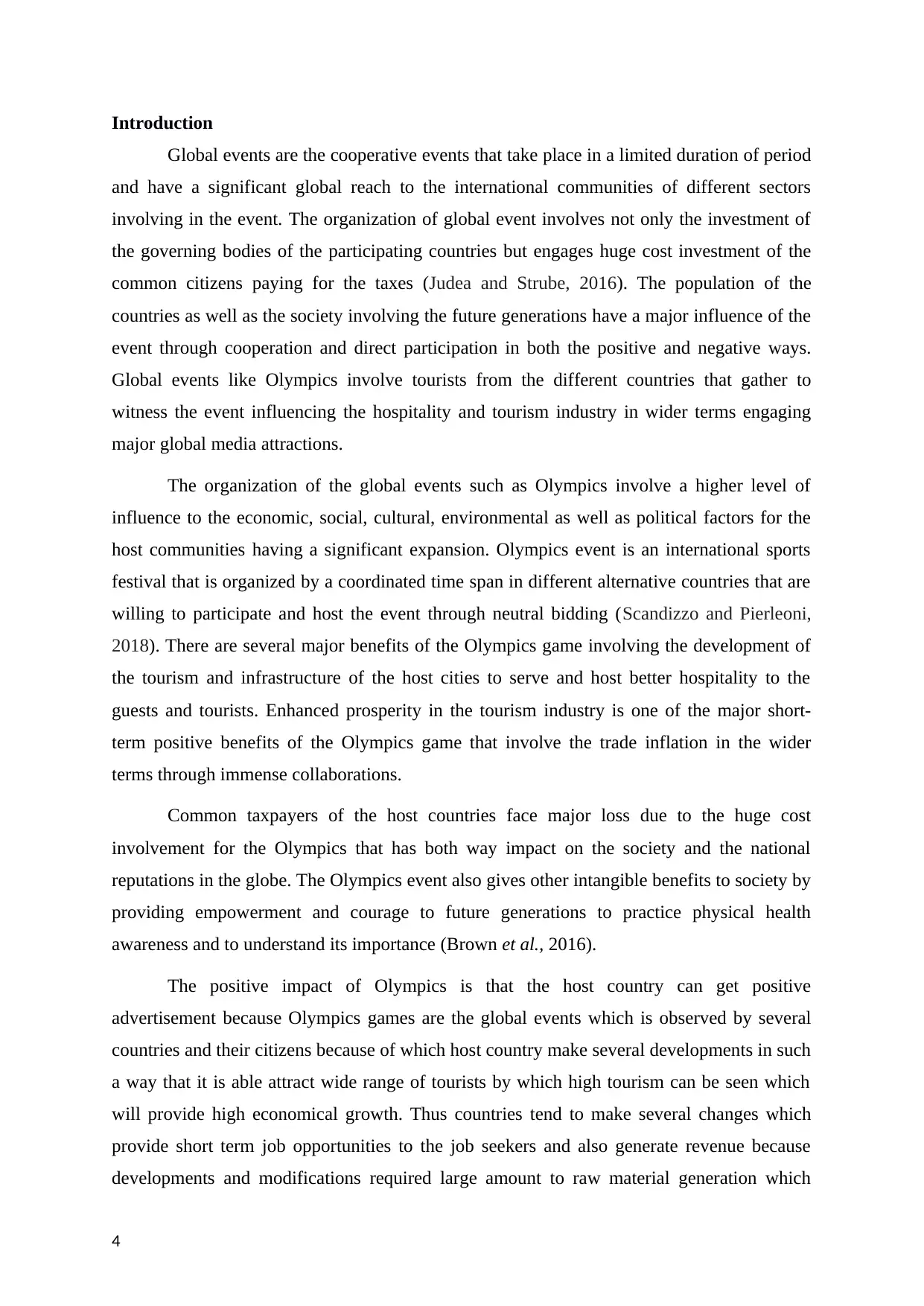
Introduction
Global events are the cooperative events that take place in a limited duration of period
and have a significant global reach to the international communities of different sectors
involving in the event. The organization of global event involves not only the investment of
the governing bodies of the participating countries but engages huge cost investment of the
common citizens paying for the taxes (Judea and Strube, 2016). The population of the
countries as well as the society involving the future generations have a major influence of the
event through cooperation and direct participation in both the positive and negative ways.
Global events like Olympics involve tourists from the different countries that gather to
witness the event influencing the hospitality and tourism industry in wider terms engaging
major global media attractions.
The organization of the global events such as Olympics involve a higher level of
influence to the economic, social, cultural, environmental as well as political factors for the
host communities having a significant expansion. Olympics event is an international sports
festival that is organized by a coordinated time span in different alternative countries that are
willing to participate and host the event through neutral bidding (Scandizzo and Pierleoni,
2018). There are several major benefits of the Olympics game involving the development of
the tourism and infrastructure of the host cities to serve and host better hospitality to the
guests and tourists. Enhanced prosperity in the tourism industry is one of the major short-
term positive benefits of the Olympics game that involve the trade inflation in the wider
terms through immense collaborations.
Common taxpayers of the host countries face major loss due to the huge cost
involvement for the Olympics that has both way impact on the society and the national
reputations in the globe. The Olympics event also gives other intangible benefits to society by
providing empowerment and courage to future generations to practice physical health
awareness and to understand its importance (Brown et al., 2016).
The positive impact of Olympics is that the host country can get positive
advertisement because Olympics games are the global events which is observed by several
countries and their citizens because of which host country make several developments in such
a way that it is able attract wide range of tourists by which high tourism can be seen which
will provide high economical growth. Thus countries tend to make several changes which
provide short term job opportunities to the job seekers and also generate revenue because
developments and modifications required large amount to raw material generation which
4
Global events are the cooperative events that take place in a limited duration of period
and have a significant global reach to the international communities of different sectors
involving in the event. The organization of global event involves not only the investment of
the governing bodies of the participating countries but engages huge cost investment of the
common citizens paying for the taxes (Judea and Strube, 2016). The population of the
countries as well as the society involving the future generations have a major influence of the
event through cooperation and direct participation in both the positive and negative ways.
Global events like Olympics involve tourists from the different countries that gather to
witness the event influencing the hospitality and tourism industry in wider terms engaging
major global media attractions.
The organization of the global events such as Olympics involve a higher level of
influence to the economic, social, cultural, environmental as well as political factors for the
host communities having a significant expansion. Olympics event is an international sports
festival that is organized by a coordinated time span in different alternative countries that are
willing to participate and host the event through neutral bidding (Scandizzo and Pierleoni,
2018). There are several major benefits of the Olympics game involving the development of
the tourism and infrastructure of the host cities to serve and host better hospitality to the
guests and tourists. Enhanced prosperity in the tourism industry is one of the major short-
term positive benefits of the Olympics game that involve the trade inflation in the wider
terms through immense collaborations.
Common taxpayers of the host countries face major loss due to the huge cost
involvement for the Olympics that has both way impact on the society and the national
reputations in the globe. The Olympics event also gives other intangible benefits to society by
providing empowerment and courage to future generations to practice physical health
awareness and to understand its importance (Brown et al., 2016).
The positive impact of Olympics is that the host country can get positive
advertisement because Olympics games are the global events which is observed by several
countries and their citizens because of which host country make several developments in such
a way that it is able attract wide range of tourists by which high tourism can be seen which
will provide high economical growth. Thus countries tend to make several changes which
provide short term job opportunities to the job seekers and also generate revenue because
developments and modifications required large amount to raw material generation which
4
Paraphrase This Document
Need a fresh take? Get an instant paraphrase of this document with our AI Paraphraser
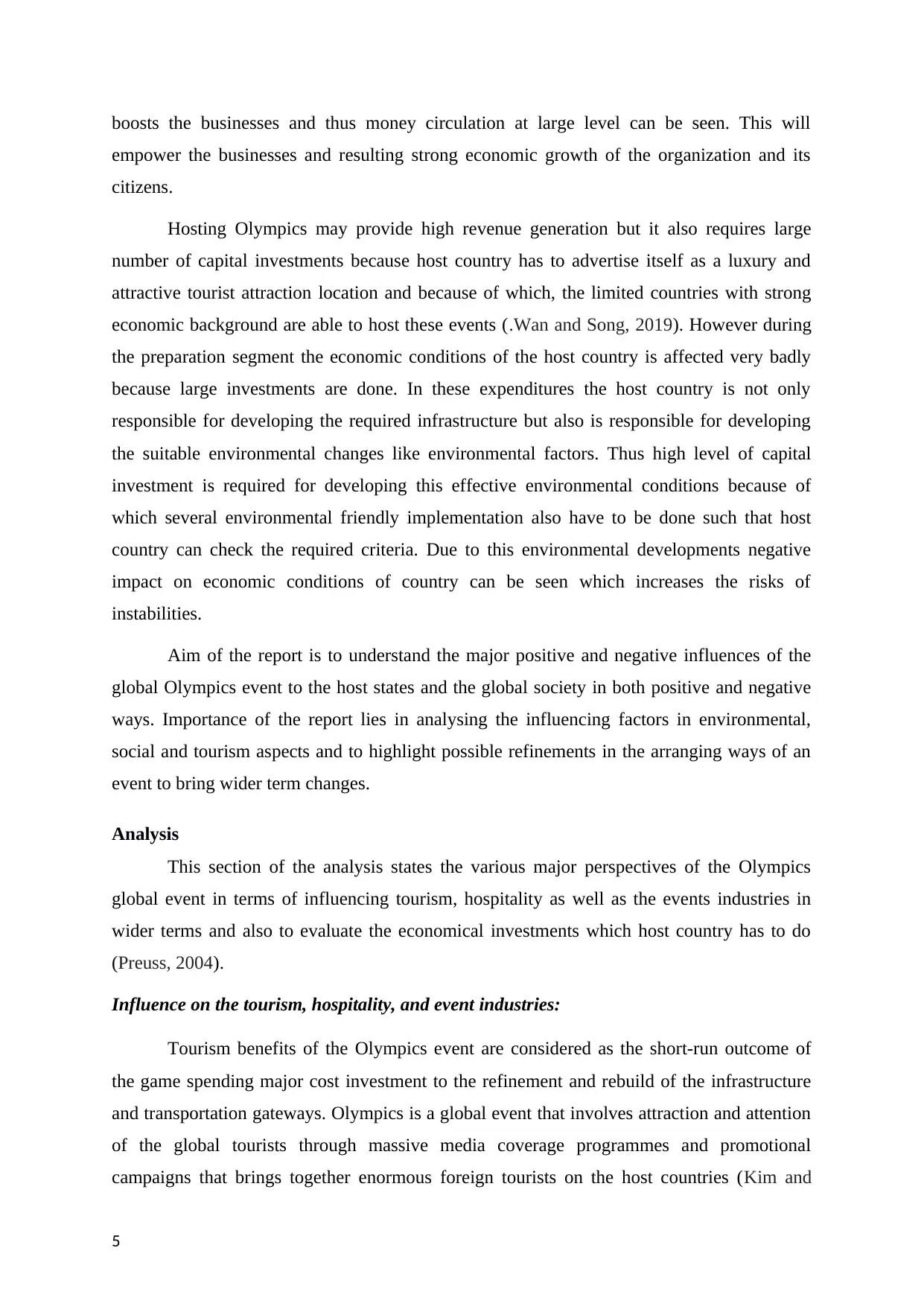
boosts the businesses and thus money circulation at large level can be seen. This will
empower the businesses and resulting strong economic growth of the organization and its
citizens.
Hosting Olympics may provide high revenue generation but it also requires large
number of capital investments because host country has to advertise itself as a luxury and
attractive tourist attraction location and because of which, the limited countries with strong
economic background are able to host these events (.Wan and Song, 2019). However during
the preparation segment the economic conditions of the host country is affected very badly
because large investments are done. In these expenditures the host country is not only
responsible for developing the required infrastructure but also is responsible for developing
the suitable environmental changes like environmental factors. Thus high level of capital
investment is required for developing this effective environmental conditions because of
which several environmental friendly implementation also have to be done such that host
country can check the required criteria. Due to this environmental developments negative
impact on economic conditions of country can be seen which increases the risks of
instabilities.
Aim of the report is to understand the major positive and negative influences of the
global Olympics event to the host states and the global society in both positive and negative
ways. Importance of the report lies in analysing the influencing factors in environmental,
social and tourism aspects and to highlight possible refinements in the arranging ways of an
event to bring wider term changes.
Analysis
This section of the analysis states the various major perspectives of the Olympics
global event in terms of influencing tourism, hospitality as well as the events industries in
wider terms and also to evaluate the economical investments which host country has to do
(Preuss, 2004).
Influence on the tourism, hospitality, and event industries:
Tourism benefits of the Olympics event are considered as the short-run outcome of
the game spending major cost investment to the refinement and rebuild of the infrastructure
and transportation gateways. Olympics is a global event that involves attraction and attention
of the global tourists through massive media coverage programmes and promotional
campaigns that brings together enormous foreign tourists on the host countries (Kim and
5
empower the businesses and resulting strong economic growth of the organization and its
citizens.
Hosting Olympics may provide high revenue generation but it also requires large
number of capital investments because host country has to advertise itself as a luxury and
attractive tourist attraction location and because of which, the limited countries with strong
economic background are able to host these events (.Wan and Song, 2019). However during
the preparation segment the economic conditions of the host country is affected very badly
because large investments are done. In these expenditures the host country is not only
responsible for developing the required infrastructure but also is responsible for developing
the suitable environmental changes like environmental factors. Thus high level of capital
investment is required for developing this effective environmental conditions because of
which several environmental friendly implementation also have to be done such that host
country can check the required criteria. Due to this environmental developments negative
impact on economic conditions of country can be seen which increases the risks of
instabilities.
Aim of the report is to understand the major positive and negative influences of the
global Olympics event to the host states and the global society in both positive and negative
ways. Importance of the report lies in analysing the influencing factors in environmental,
social and tourism aspects and to highlight possible refinements in the arranging ways of an
event to bring wider term changes.
Analysis
This section of the analysis states the various major perspectives of the Olympics
global event in terms of influencing tourism, hospitality as well as the events industries in
wider terms and also to evaluate the economical investments which host country has to do
(Preuss, 2004).
Influence on the tourism, hospitality, and event industries:
Tourism benefits of the Olympics event are considered as the short-run outcome of
the game spending major cost investment to the refinement and rebuild of the infrastructure
and transportation gateways. Olympics is a global event that involves attraction and attention
of the global tourists through massive media coverage programmes and promotional
campaigns that brings together enormous foreign tourists on the host countries (Kim and
5
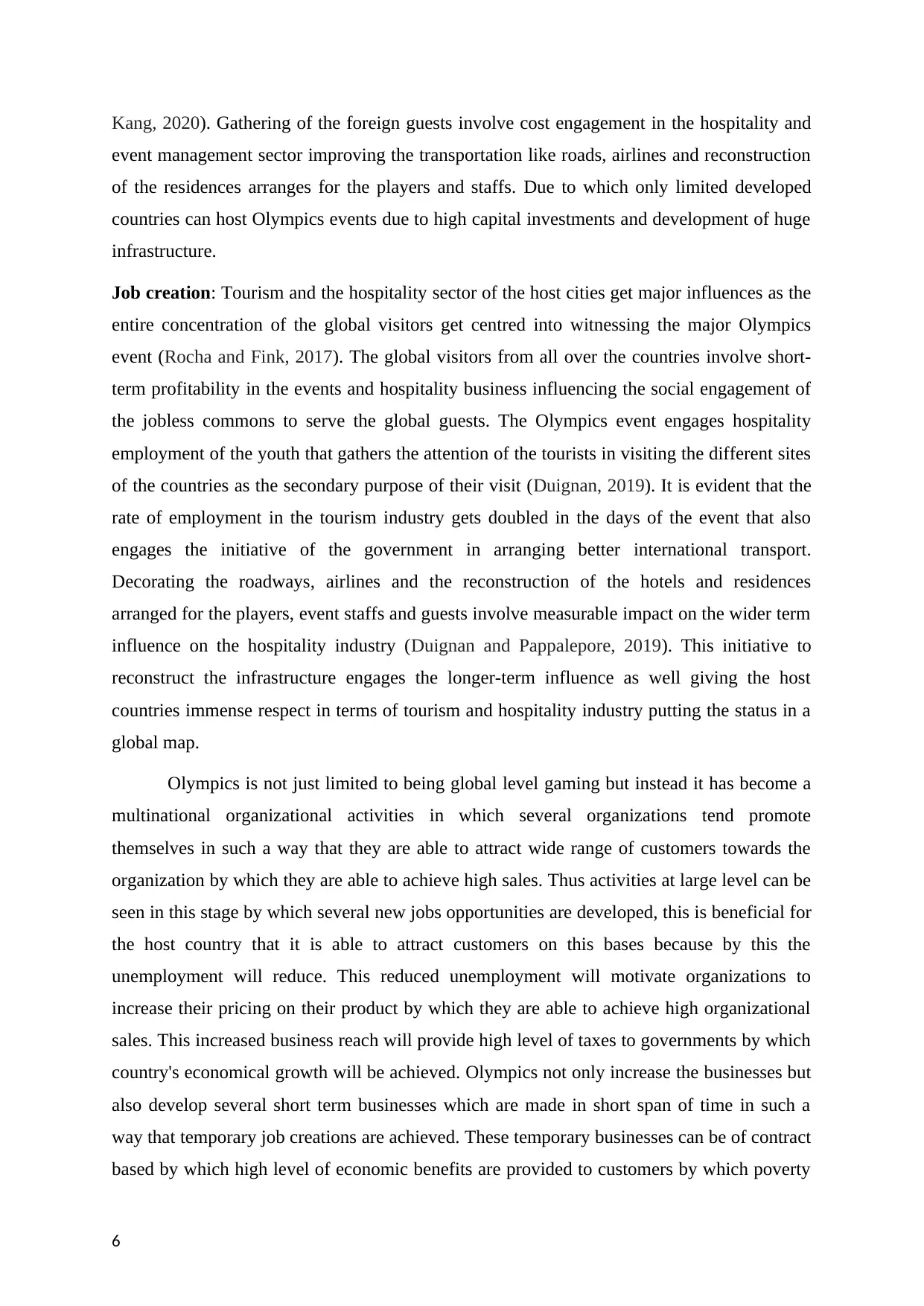
Kang, 2020). Gathering of the foreign guests involve cost engagement in the hospitality and
event management sector improving the transportation like roads, airlines and reconstruction
of the residences arranges for the players and staffs. Due to which only limited developed
countries can host Olympics events due to high capital investments and development of huge
infrastructure.
Job creation: Tourism and the hospitality sector of the host cities get major influences as the
entire concentration of the global visitors get centred into witnessing the major Olympics
event (Rocha and Fink, 2017). The global visitors from all over the countries involve short-
term profitability in the events and hospitality business influencing the social engagement of
the jobless commons to serve the global guests. The Olympics event engages hospitality
employment of the youth that gathers the attention of the tourists in visiting the different sites
of the countries as the secondary purpose of their visit (Duignan, 2019). It is evident that the
rate of employment in the tourism industry gets doubled in the days of the event that also
engages the initiative of the government in arranging better international transport.
Decorating the roadways, airlines and the reconstruction of the hotels and residences
arranged for the players, event staffs and guests involve measurable impact on the wider term
influence on the hospitality industry (Duignan and Pappalepore, 2019). This initiative to
reconstruct the infrastructure engages the longer-term influence as well giving the host
countries immense respect in terms of tourism and hospitality industry putting the status in a
global map.
Olympics is not just limited to being global level gaming but instead it has become a
multinational organizational activities in which several organizations tend promote
themselves in such a way that they are able to attract wide range of customers towards the
organization by which they are able to achieve high sales. Thus activities at large level can be
seen in this stage by which several new jobs opportunities are developed, this is beneficial for
the host country that it is able to attract customers on this bases because by this the
unemployment will reduce. This reduced unemployment will motivate organizations to
increase their pricing on their product by which they are able to achieve high organizational
sales. This increased business reach will provide high level of taxes to governments by which
country's economical growth will be achieved. Olympics not only increase the businesses but
also develop several short term businesses which are made in short span of time in such a
way that temporary job creations are achieved. These temporary businesses can be of contract
based by which high level of economic benefits are provided to customers by which poverty
6
event management sector improving the transportation like roads, airlines and reconstruction
of the residences arranges for the players and staffs. Due to which only limited developed
countries can host Olympics events due to high capital investments and development of huge
infrastructure.
Job creation: Tourism and the hospitality sector of the host cities get major influences as the
entire concentration of the global visitors get centred into witnessing the major Olympics
event (Rocha and Fink, 2017). The global visitors from all over the countries involve short-
term profitability in the events and hospitality business influencing the social engagement of
the jobless commons to serve the global guests. The Olympics event engages hospitality
employment of the youth that gathers the attention of the tourists in visiting the different sites
of the countries as the secondary purpose of their visit (Duignan, 2019). It is evident that the
rate of employment in the tourism industry gets doubled in the days of the event that also
engages the initiative of the government in arranging better international transport.
Decorating the roadways, airlines and the reconstruction of the hotels and residences
arranged for the players, event staffs and guests involve measurable impact on the wider term
influence on the hospitality industry (Duignan and Pappalepore, 2019). This initiative to
reconstruct the infrastructure engages the longer-term influence as well giving the host
countries immense respect in terms of tourism and hospitality industry putting the status in a
global map.
Olympics is not just limited to being global level gaming but instead it has become a
multinational organizational activities in which several organizations tend promote
themselves in such a way that they are able to attract wide range of customers towards the
organization by which they are able to achieve high sales. Thus activities at large level can be
seen in this stage by which several new jobs opportunities are developed, this is beneficial for
the host country that it is able to attract customers on this bases because by this the
unemployment will reduce. This reduced unemployment will motivate organizations to
increase their pricing on their product by which they are able to achieve high organizational
sales. This increased business reach will provide high level of taxes to governments by which
country's economical growth will be achieved. Olympics not only increase the businesses but
also develop several short term businesses which are made in short span of time in such a
way that temporary job creations are achieved. These temporary businesses can be of contract
based by which high level of economic benefits are provided to customers by which poverty
6
⊘ This is a preview!⊘
Do you want full access?
Subscribe today to unlock all pages.

Trusted by 1+ million students worldwide
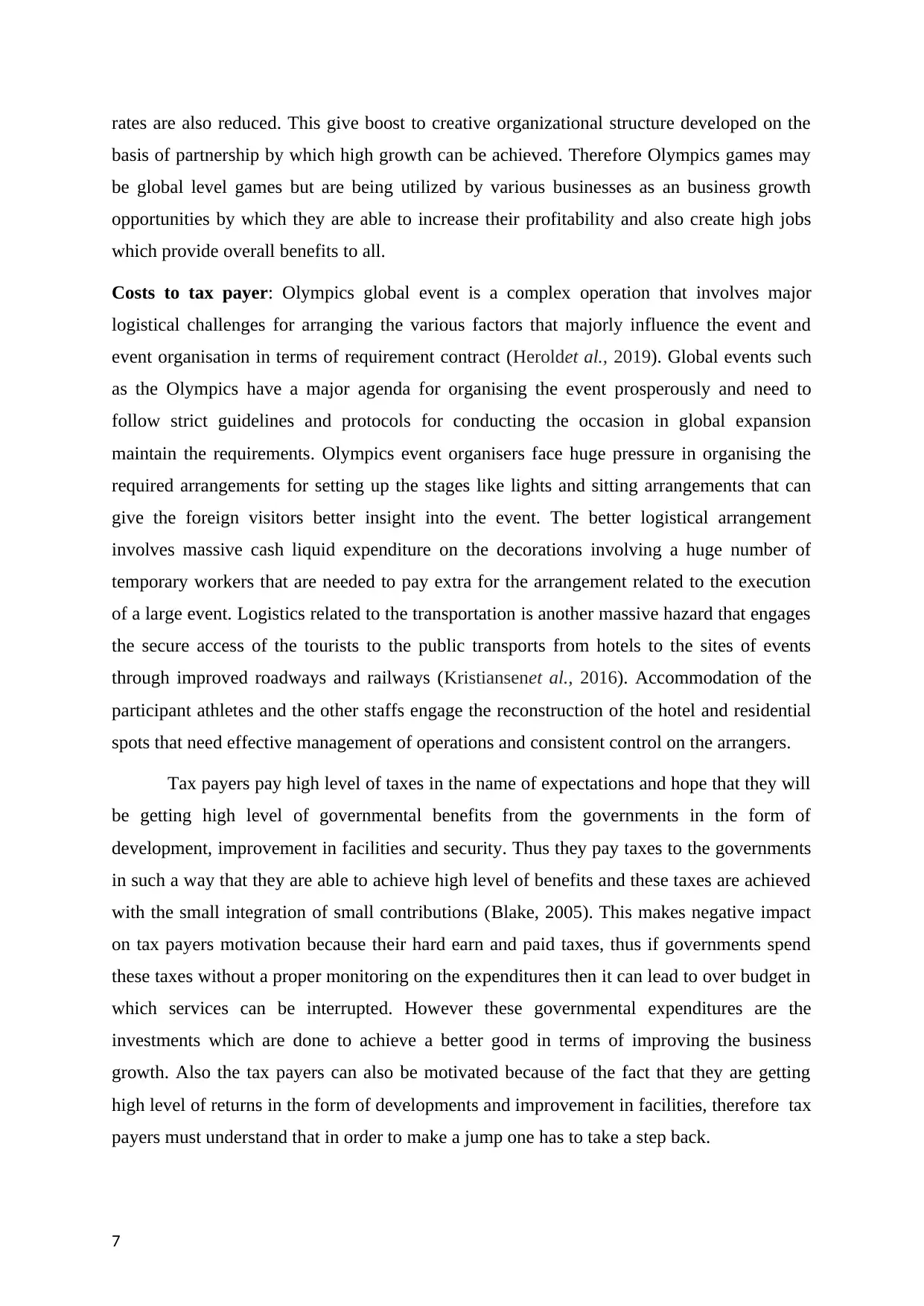
rates are also reduced. This give boost to creative organizational structure developed on the
basis of partnership by which high growth can be achieved. Therefore Olympics games may
be global level games but are being utilized by various businesses as an business growth
opportunities by which they are able to increase their profitability and also create high jobs
which provide overall benefits to all.
Costs to tax payer: Olympics global event is a complex operation that involves major
logistical challenges for arranging the various factors that majorly influence the event and
event organisation in terms of requirement contract (Heroldet al., 2019). Global events such
as the Olympics have a major agenda for organising the event prosperously and need to
follow strict guidelines and protocols for conducting the occasion in global expansion
maintain the requirements. Olympics event organisers face huge pressure in organising the
required arrangements for setting up the stages like lights and sitting arrangements that can
give the foreign visitors better insight into the event. The better logistical arrangement
involves massive cash liquid expenditure on the decorations involving a huge number of
temporary workers that are needed to pay extra for the arrangement related to the execution
of a large event. Logistics related to the transportation is another massive hazard that engages
the secure access of the tourists to the public transports from hotels to the sites of events
through improved roadways and railways (Kristiansenet al., 2016). Accommodation of the
participant athletes and the other staffs engage the reconstruction of the hotel and residential
spots that need effective management of operations and consistent control on the arrangers.
Tax payers pay high level of taxes in the name of expectations and hope that they will
be getting high level of governmental benefits from the governments in the form of
development, improvement in facilities and security. Thus they pay taxes to the governments
in such a way that they are able to achieve high level of benefits and these taxes are achieved
with the small integration of small contributions (Blake, 2005). This makes negative impact
on tax payers motivation because their hard earn and paid taxes, thus if governments spend
these taxes without a proper monitoring on the expenditures then it can lead to over budget in
which services can be interrupted. However these governmental expenditures are the
investments which are done to achieve a better good in terms of improving the business
growth. Also the tax payers can also be motivated because of the fact that they are getting
high level of returns in the form of developments and improvement in facilities, therefore tax
payers must understand that in order to make a jump one has to take a step back.
7
basis of partnership by which high growth can be achieved. Therefore Olympics games may
be global level games but are being utilized by various businesses as an business growth
opportunities by which they are able to increase their profitability and also create high jobs
which provide overall benefits to all.
Costs to tax payer: Olympics global event is a complex operation that involves major
logistical challenges for arranging the various factors that majorly influence the event and
event organisation in terms of requirement contract (Heroldet al., 2019). Global events such
as the Olympics have a major agenda for organising the event prosperously and need to
follow strict guidelines and protocols for conducting the occasion in global expansion
maintain the requirements. Olympics event organisers face huge pressure in organising the
required arrangements for setting up the stages like lights and sitting arrangements that can
give the foreign visitors better insight into the event. The better logistical arrangement
involves massive cash liquid expenditure on the decorations involving a huge number of
temporary workers that are needed to pay extra for the arrangement related to the execution
of a large event. Logistics related to the transportation is another massive hazard that engages
the secure access of the tourists to the public transports from hotels to the sites of events
through improved roadways and railways (Kristiansenet al., 2016). Accommodation of the
participant athletes and the other staffs engage the reconstruction of the hotel and residential
spots that need effective management of operations and consistent control on the arrangers.
Tax payers pay high level of taxes in the name of expectations and hope that they will
be getting high level of governmental benefits from the governments in the form of
development, improvement in facilities and security. Thus they pay taxes to the governments
in such a way that they are able to achieve high level of benefits and these taxes are achieved
with the small integration of small contributions (Blake, 2005). This makes negative impact
on tax payers motivation because their hard earn and paid taxes, thus if governments spend
these taxes without a proper monitoring on the expenditures then it can lead to over budget in
which services can be interrupted. However these governmental expenditures are the
investments which are done to achieve a better good in terms of improving the business
growth. Also the tax payers can also be motivated because of the fact that they are getting
high level of returns in the form of developments and improvement in facilities, therefore tax
payers must understand that in order to make a jump one has to take a step back.
7
Paraphrase This Document
Need a fresh take? Get an instant paraphrase of this document with our AI Paraphraser
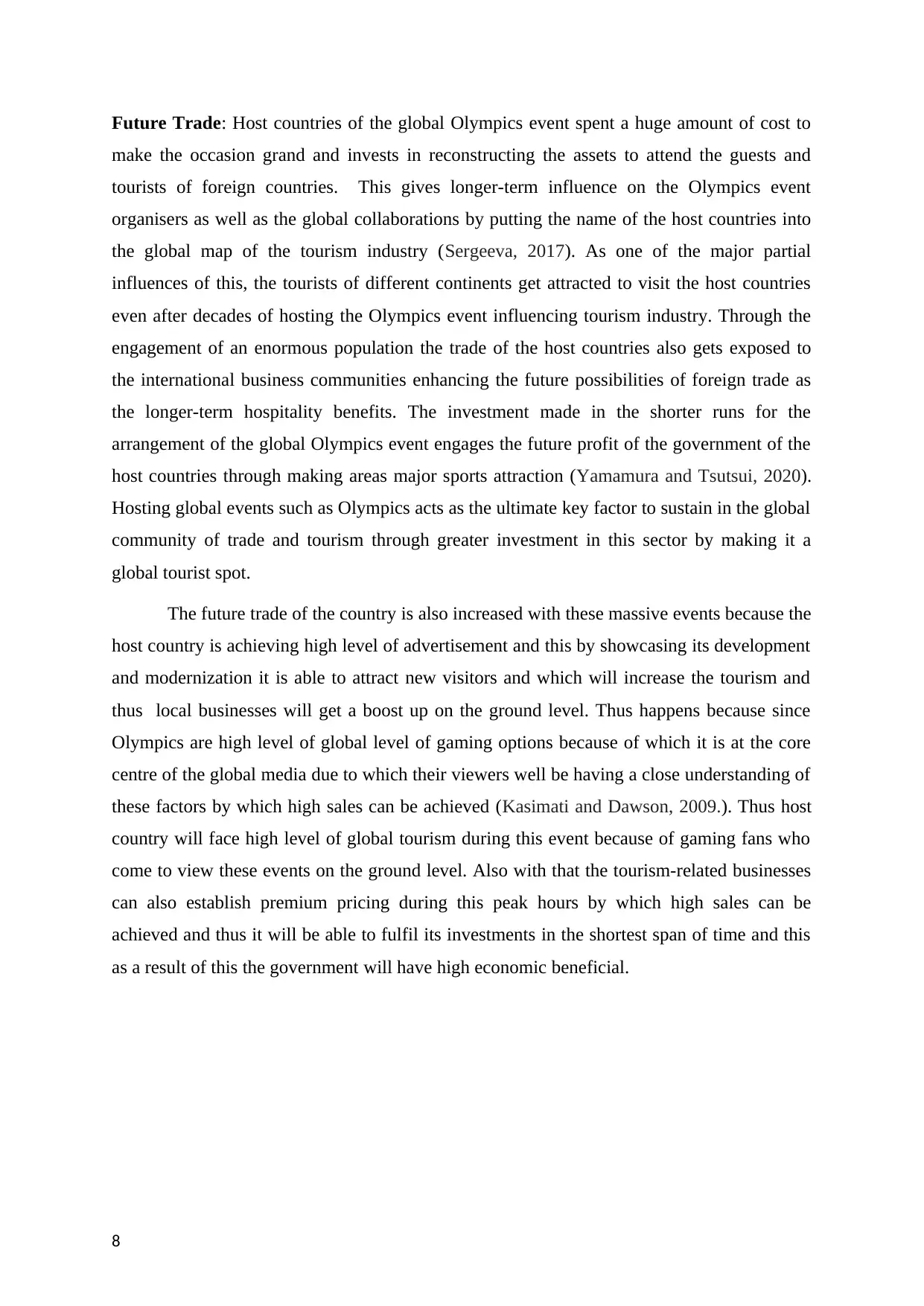
Future Trade: Host countries of the global Olympics event spent a huge amount of cost to
make the occasion grand and invests in reconstructing the assets to attend the guests and
tourists of foreign countries. This gives longer-term influence on the Olympics event
organisers as well as the global collaborations by putting the name of the host countries into
the global map of the tourism industry (Sergeeva, 2017). As one of the major partial
influences of this, the tourists of different continents get attracted to visit the host countries
even after decades of hosting the Olympics event influencing tourism industry. Through the
engagement of an enormous population the trade of the host countries also gets exposed to
the international business communities enhancing the future possibilities of foreign trade as
the longer-term hospitality benefits. The investment made in the shorter runs for the
arrangement of the global Olympics event engages the future profit of the government of the
host countries through making areas major sports attraction (Yamamura and Tsutsui, 2020).
Hosting global events such as Olympics acts as the ultimate key factor to sustain in the global
community of trade and tourism through greater investment in this sector by making it a
global tourist spot.
The future trade of the country is also increased with these massive events because the
host country is achieving high level of advertisement and this by showcasing its development
and modernization it is able to attract new visitors and which will increase the tourism and
thus local businesses will get a boost up on the ground level. Thus happens because since
Olympics are high level of global level of gaming options because of which it is at the core
centre of the global media due to which their viewers well be having a close understanding of
these factors by which high sales can be achieved (Kasimati and Dawson, 2009.). Thus host
country will face high level of global tourism during this event because of gaming fans who
come to view these events on the ground level. Also with that the tourism-related businesses
can also establish premium pricing during this peak hours by which high sales can be
achieved and thus it will be able to fulfil its investments in the shortest span of time and this
as a result of this the government will have high economic beneficial.
8
make the occasion grand and invests in reconstructing the assets to attend the guests and
tourists of foreign countries. This gives longer-term influence on the Olympics event
organisers as well as the global collaborations by putting the name of the host countries into
the global map of the tourism industry (Sergeeva, 2017). As one of the major partial
influences of this, the tourists of different continents get attracted to visit the host countries
even after decades of hosting the Olympics event influencing tourism industry. Through the
engagement of an enormous population the trade of the host countries also gets exposed to
the international business communities enhancing the future possibilities of foreign trade as
the longer-term hospitality benefits. The investment made in the shorter runs for the
arrangement of the global Olympics event engages the future profit of the government of the
host countries through making areas major sports attraction (Yamamura and Tsutsui, 2020).
Hosting global events such as Olympics acts as the ultimate key factor to sustain in the global
community of trade and tourism through greater investment in this sector by making it a
global tourist spot.
The future trade of the country is also increased with these massive events because the
host country is achieving high level of advertisement and this by showcasing its development
and modernization it is able to attract new visitors and which will increase the tourism and
thus local businesses will get a boost up on the ground level. Thus happens because since
Olympics are high level of global level of gaming options because of which it is at the core
centre of the global media due to which their viewers well be having a close understanding of
these factors by which high sales can be achieved (Kasimati and Dawson, 2009.). Thus host
country will face high level of global tourism during this event because of gaming fans who
come to view these events on the ground level. Also with that the tourism-related businesses
can also establish premium pricing during this peak hours by which high sales can be
achieved and thus it will be able to fulfil its investments in the shortest span of time and this
as a result of this the government will have high economic beneficial.
8
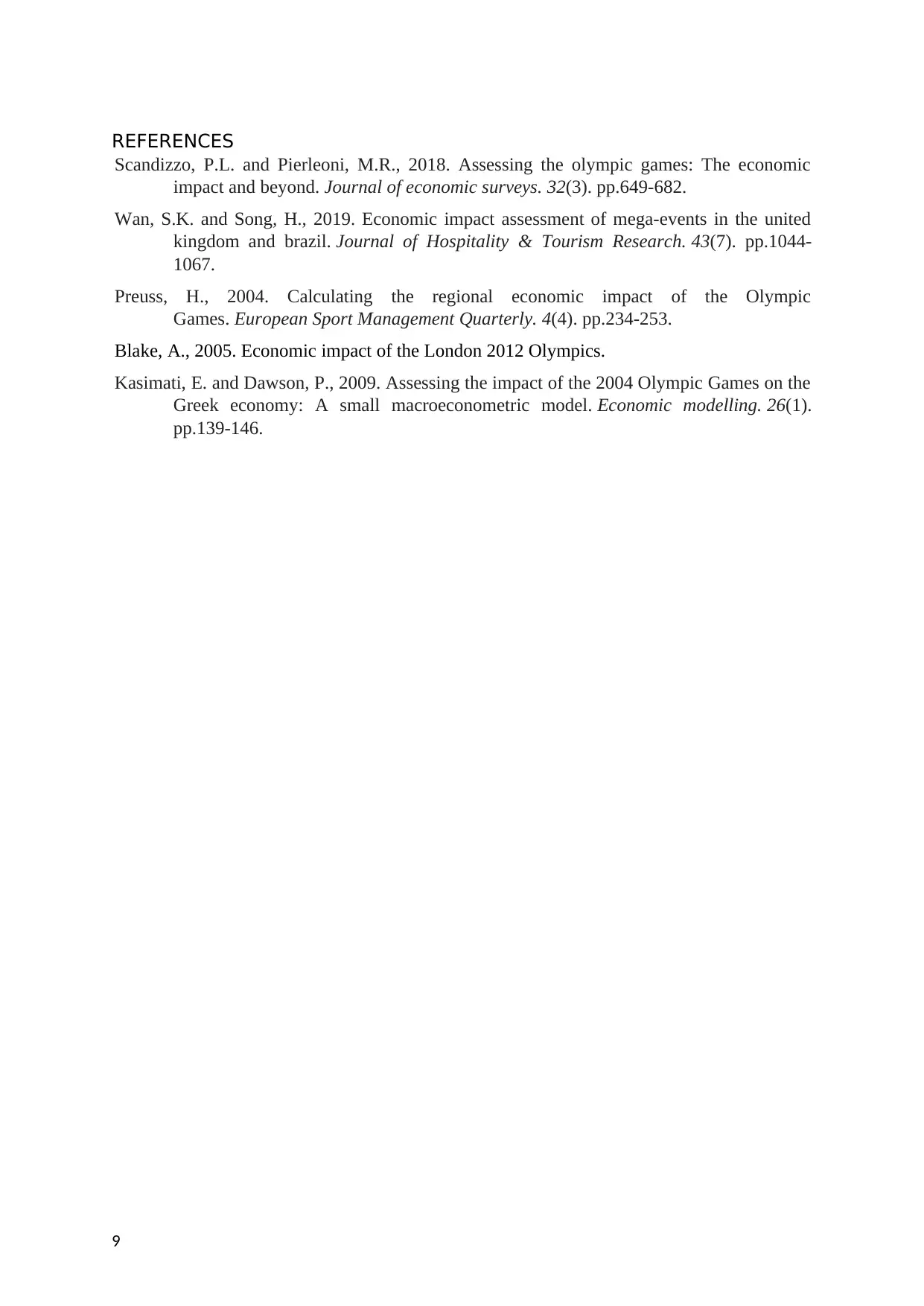
REFERENCES
Scandizzo, P.L. and Pierleoni, M.R., 2018. Assessing the olympic games: The economic
impact and beyond. Journal of economic surveys. 32(3). pp.649-682.
Wan, S.K. and Song, H., 2019. Economic impact assessment of mega-events in the united
kingdom and brazil. Journal of Hospitality & Tourism Research. 43(7). pp.1044-
1067.
Preuss, H., 2004. Calculating the regional economic impact of the Olympic
Games. European Sport Management Quarterly. 4(4). pp.234-253.
Blake, A., 2005. Economic impact of the London 2012 Olympics.
Kasimati, E. and Dawson, P., 2009. Assessing the impact of the 2004 Olympic Games on the
Greek economy: A small macroeconometric model. Economic modelling. 26(1).
pp.139-146.
9
Scandizzo, P.L. and Pierleoni, M.R., 2018. Assessing the olympic games: The economic
impact and beyond. Journal of economic surveys. 32(3). pp.649-682.
Wan, S.K. and Song, H., 2019. Economic impact assessment of mega-events in the united
kingdom and brazil. Journal of Hospitality & Tourism Research. 43(7). pp.1044-
1067.
Preuss, H., 2004. Calculating the regional economic impact of the Olympic
Games. European Sport Management Quarterly. 4(4). pp.234-253.
Blake, A., 2005. Economic impact of the London 2012 Olympics.
Kasimati, E. and Dawson, P., 2009. Assessing the impact of the 2004 Olympic Games on the
Greek economy: A small macroeconometric model. Economic modelling. 26(1).
pp.139-146.
9
⊘ This is a preview!⊘
Do you want full access?
Subscribe today to unlock all pages.

Trusted by 1+ million students worldwide
1 out of 9
Related Documents
Your All-in-One AI-Powered Toolkit for Academic Success.
+13062052269
info@desklib.com
Available 24*7 on WhatsApp / Email
![[object Object]](/_next/static/media/star-bottom.7253800d.svg)
Unlock your academic potential
Copyright © 2020–2026 A2Z Services. All Rights Reserved. Developed and managed by ZUCOL.





